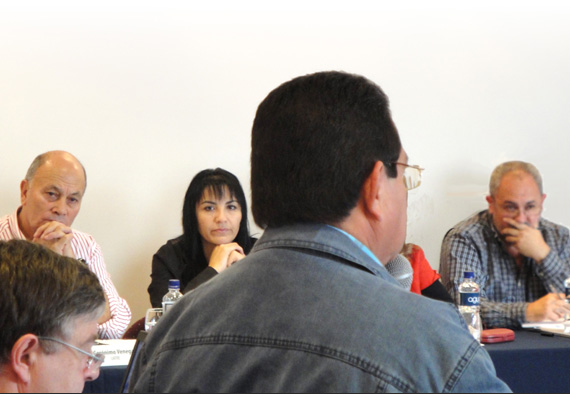|
In addition to
causing major environmental impacts, open-pit mining projects often displace
entire communities and strip them of their lands.
Sirel spoke
with Guillermo Rivera, president of the National Union of Agroindustry Workers
of Colombia (SINTRAINAGRO), who expressed his concern over the serious threat
that peasant and indigenous communities are facing.
-What can you
tell us about the situation in the department of Antioquia?
-Two years ago,
prospectors found coal deposits in the municipalities of Necoclí, San Pedro de
Urabá and Arboletes, in northwest Colombia.
These are rural
areas that are home to peasants who work small plots no larger than two to three
hectares, and who have traditionally lived on the food they grow.
After these
deposits were discovered, the Institute for the Development of Antioquia (IDEA)
-a decentralized public promotion and development agency that operates at the
departmental level- secured the rights over some 100,000 hectares, with the aim
of conducting a more in-depth assessment of these coal reserves.
It also signed
an agreement with the engineering consultancy firm Geominas to discuss
the granting of 11 concessions, and has already initiated negotiations with
Korean-based transnational corporations and a Belgian-Swiss consortium.
These
transnational corporations are interested in extracting over 500,000 tons a
month, an operation that will involve the construction of a railroad and a
commercial port in Arboletes, with an estimated investment of 46 million US
dollars.
-What is
SINTRAINAGRO most worried about?
-Our main
concern is that launching the project that will benefit these transnational
corporations will lead to the area’s peasant and indigenous communities being
forced out of their lands.
|
Large landowners have
been constantly pressuring peasants to sell their lands. They want
to force peasants into selling their property over to them so they
can then resell it at a much higher price. |
We’ve been
warning the authorities of this risk, asking them to intervene directly and find
an alternative. They need to step in and protect these communities from yet
another abuse, which could result in violence and clashes.
-What reactions
have you had?
-We’re
discussing the issue. We’ve met several times with the governor of the
department of Antioquia and with the executive manager of IDEA.
We’re also
planning to hold a forum in Urabá to present the problem and look for solutions.
The project’s proponents have assured us that all the municipalities involved
will benefit, that they will receive royalties of up to 6 percent of the profits
obtained from coal extraction activities. But that’s a trifling amount that will
in no way provide a solution for all the people who will be displaced by these
activities.
-What does
SINTRAINAGRO propose?
-We’re
demanding that a negotiating table be set up in the region to discuss the
mechanisms that need to be put in place to protect these communities.
Also, we want
to know what guarantees the people of the region will have that this will not
turn into a hotbed of violence and exploitation, as large landowners have been
constantly pressuring peasants to sell their lands.
They want to
force peasants into selling their property over to them so they can then resell
it at a much higher price.
-What future
steps are you planning?
-SINTRAINAGRO
is helping these communities organize, advising them not to negotiate their land
and to refuse to be pushed out.
We’ve seen this
happen before in other regions of Colombia, for example, in the Cerrejón
mines region in the department of La Guajira, where peasants and indigenous
communities were displaced with no social guarantees.
That’s what
they want to do now in Urabá, which is why we’re going to stand firm and prevent
these negotiations. We’re not going to allow any more people to be displaced.
 |